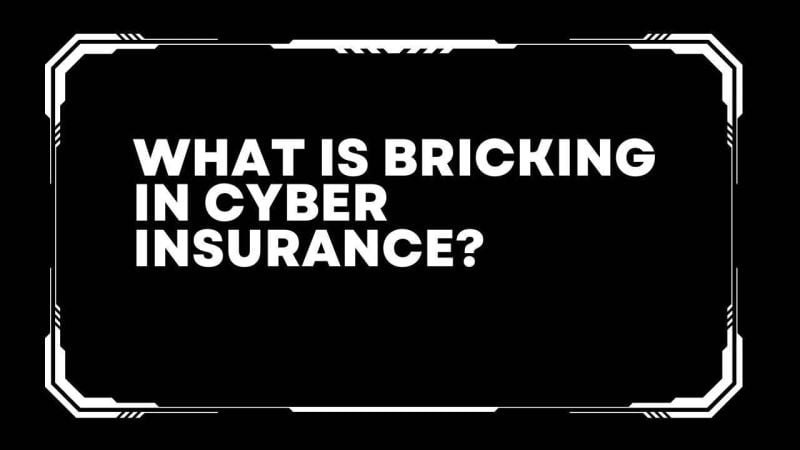Cyber threats are becoming more common, and the financial losses they cause can devastate enterprises. Like car or homeowners insurance which protects businesses from covered events, cyber Insurance does the same. Cyber insurance policies vary in coverage, cost, and duration, but they generally reduce the risks of cyberattacks and data breaches. In 2019, insured cyber losses reached $1.8 billion, up 50% from the previous year, while breach response expenses rose from 29% to 52% of claim costs. Cyber insurers have raised rates and struggled to meet demand. Despite the cost, Cyber Insurance helps safeguard firms from cyberattacks and data breaches. In this article, we will explore what is bricking in cyber Insurance.
What is bricking in cyber Insurance?
In cyber Insurance, “bricking” refers to malware’s lasting harm to electronic devices. This can permanently damage a device. Cyber insurance policies sometimes exclude bodily injury and property damage, which might be problematic for certain industries. Without bricking coverage, replacing computer systems and other devices damaged and useless by malware can increase the expense of cyber incident recovery.
If your cyber liability policy covers bricking, your insurance carrier will assist in paying for hardware replacement or restoration if malware irreversibly damages the operating system’s firmware. Cyber insurance packages might provide bricking coverage for a fee. One tech forum user said bricking coverage costs $1510 annually with a $250K claim limit.
Cyber insurance “bricking” is a novel concept that is gaining popularity. Bricking refers to cyber Insurance that protects against data loss or inaccessibility due to a cybersecurity event. As cyberattacks are increasing, this coverage is important.
Cyber Insurance can shield companies from significant data breach losses. This protection can help firms avoid breach remediation expenditures, including data restoration and regulatory fines and penalties.
Bricking in cyber Insurance can safeguard against financial and reputational damage. Customers, partners, and other stakeholders may lose trust in a company after a data breach becomes public. This coverage mitigates reputational damage from a breach.
As companies realize the financial and reputational risks of cyberattacks, bricking in cyber Insurance is becoming increasingly common. Cyber Insurance offers financial, reputational, and peace of mind. Thus, cyber Insurance is becoming increasingly crucial for enterprises.
What is a bricking incident?
A bricking incident occurs when a computer, smartphone, or tablet becomes fully inoperable, like a brick. Physical damage, software updates or alterations, viruses, or firmware flaws can cause this.
A cyber attack that bricks actual hardware or equipment, such as a computer system or other operational technology, disrupts its intended operations.
“Bricking” refers to technological businesses that only maintain and upgrade their latest products, making previous ones obsolete and unusable.
A bricked device or system is inoperable owing to physical or software faults. It can cost people and businesses money and disrupt vital services.
What does bricking Insurance cover?
Malware or other harmful code can irreparably destroy computer systems and other hardware, making them unusable. Bricking Insurance covers the cost of replacing them. Without this coverage, replacing “bricked” electronics would considerably increase the cost of cyber attack recovery.
Bricking Insurance is part of cyber Insurance, which protects organizations from cyber threats. “Bricking” can also mean a consumer electrical device’s complete and irreversible failure, usually due to defective firmware.
Computer hardware insurance (bricking Insurance) protects users from hardware failure costs. This Insurance covers motherboards, graphics cards, hard drives, power supplies, and processors.
Bricking Insurance may cover hardware repair or replacement. It may cover hardware replacement components and labour. If the hardware is destroyed, Insurance may pay for a new one.
Bricking Insurance can safeguard your investment. It can give you peace of mind knowing you won’t have to pay to replace your equipment. This Insurance doesn’t cover software or data loss, though.




